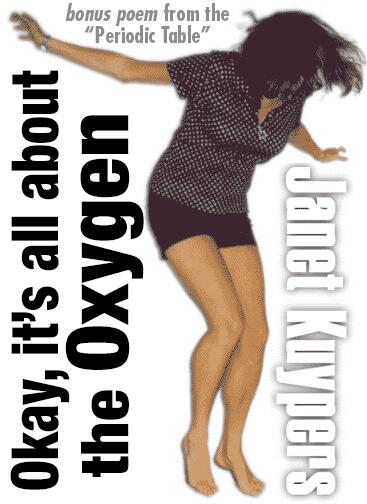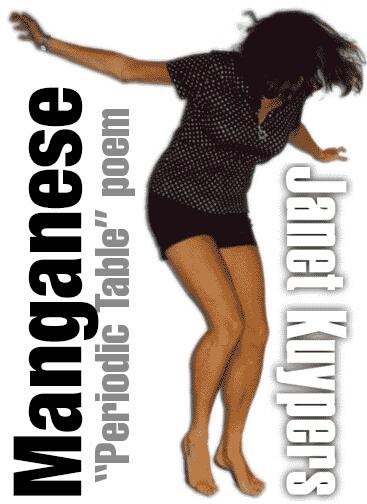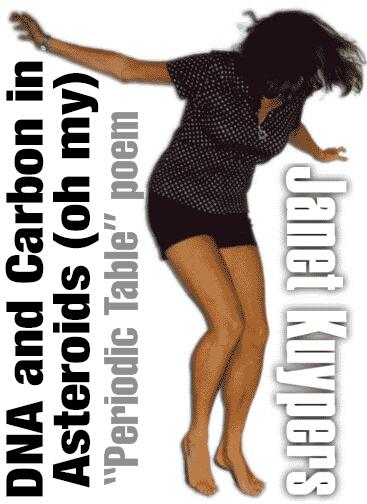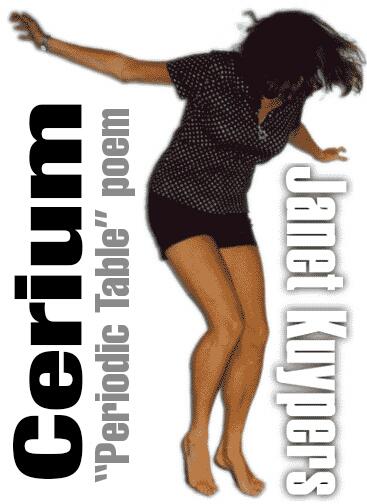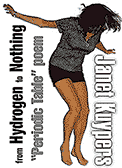Hydrogen Cyanide
Janet Kuypers
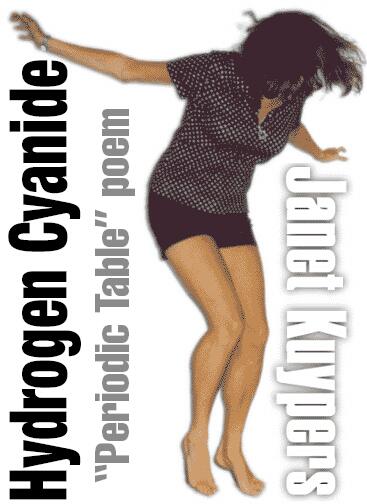
bonus poem from the “Periodic Table of Poetry” series (#01, H)
started 9/5/13, edited 9/19/13 and 9/21/13, finished 9/22/13
He was once a college chemistry professor, so he
hoped he was a shoe-in to work with the Waffen-SS.
He ended up working at the Rundfunkhaus —
a Berlin radio station broadcasting Nazi propaganda.
But after his university was bombed, he took
what he could get and was grateful for work
that didn’t require him to use a gun. But when
the Science and Research Department at
the Reich Main Security Office gave him orders
to go to the Dachau camp to retrieve paperwork,
he solemnly went home to pack for his two-day
trip, driving there one day, returning home the next.
#
He’d seen the Sachsenhausen concentration camp,
35 kilometres north of Berlin, but Sachsenhausen
was more of a training centre for Schutzstaffel officers
before the SS men were sent to oversee other camps.
And although Dachau was small, it was essentially
the first, and set the standard for all of Hitler’s camps.
He felt the tension knot in his stomach grow,
even before saying goodbye his wife and two children.
#
Arriving at the camp the next afternoon, he learned
the lieutenant general was away from his office,
so he could only get the necessary paperwork
the next morning. Which left him alone
at the camp, in a stranger’s office. He paced.
A part of him didn’t want to go out there,
there was safety inside these office walls.
Here he could remain separate from the war.
#
After nearly an hour of pacing, he decided
to just go out there. Face it. Get it over with.
And when he stepped outside the air felt heavy;
he could feel the weight of the move he made,
the weight of his legs grew heavier; he dragged
his feet, making his way to the open walkway.
Although there was that heavy haze in the air,
he knew what chemical reactions had occurred
to leave that distinct smell in the smoke
and haze working it’s way through the air.
He saw across the clearing the doors close to the
“showers”, so he walked with a determination
to bring himself to the hall. He could hear
the sounds of people inside grow louder,
but he then caught a glimpse of a guard
that just made his way to the roof. As he
got closer, he watched the soldier open
what looked like a can, then shake it
into the vent at the centre of the building,
before closing the vent and walking across
the roof before taking the ladder back down.
From the moment anything from that can
made it’s way into that building, with
every subsequent step he took, he could hear
the wails and screams get louder and louder
from the Jews inside. He stopped for a moment.
Look, he thought, he knew what this was,
get used to this, was all he could think to himself
to get his heavy feet moving again. He
caught the soldier walking down the ladder
from the building, and quickened his pace
to catch him before he got far from the building.
Not able to see the ranking on his uniform shirt,
he quickened his pace to not yell for the soldier.
With the soldier still holding the jar in his hand,
he asked if he could see the can. Once he had it
in his hands, he looked at all elements on the label.
Zyklon B. Hydrogen Cyanide. He knew
this poisonous liquid boiled just above room
temperature, so he knew that all they had to do
was drop some from a sealed can into the open hall,
poisoning thousands in only twenty minutes.
He knew the Germans first thought of using
this Prussic acid against Napoleon in eighteen
thirteen — and if they had, it would have been
the first time Hydrogen Cyanide was used in warfare…
But look at him now, the chemistry professor,
reduced to thinking of how all the Jews inhaled
the bitter almond smell of Hydrogen Cyanide,
until it combined with their red blood cells,
causing death from oxygen starvation.
He suddenly felt he needed to take a deep
breath, get in all the oxygen he could. He saw
the blue stains on the concrete walls, then walked
back to the soldier to give him the empty can,
when the soldier, making small talk, said
“one of the older Jews pleaded to me,
‘I’m a decorated vet from WWI, I was in an
artillery battalion, we shot gas shells at the
British and Americans, I shouldn’t be here,
my paperwork’s with my luggage—’ And they
just kept telling him to go into the showers…”
And he knew in WWI we shot these shells into trenches
in France, so he shrugged and gave a slight grin,
to commiserate with the soldier, but he knew
that everyone fights their own battles in this war.
He was only a lieutenant, a lower-ranking attache
than the colonel who sent him on this job,
but he still held rank over this soldier, so he told
the soldier that once there were no screams inside
and they opened the doors to bring everyone
to the crematoriums, he wanted to be notified.
Then he walked away. At fifty metres he clutched
at his pockets to find his cigarettes and lighter;
he wanted anything to calm him down and help
him focus on anything else until it was time.
#
He stood in the field, chain smoking, until
he heard the running footsteps in the distance.
He looked at his pocket watch. Twenty minutes
had passed, as he saw a soldier running
toward him. He looked at the gas chamber
and saw they had opened the doors, so he started
his methodical walk back to where he was
destined to go. He acknowledged the soldier
with a wave, and quickened his pace
to the building. He saw a few different soldiers
this time, all waiting until the cloud of gas
was cleared from the chamber so they could work.
He walked to the doorway. It was dark,
but he could make out a pyramid of people
toward that small now closed centre vent.
From what he could tell, it looked like the Jews
tossed the babies and small children toward
the top, in an effort to keep the children alive.
One of the soldiers passed him as he stared,
so he asked him how long he had been doing this.
“Nearly a year,” he answered. So he had to ask
if doing this, if seeing this, bothered him.
The man only answered, “If you do something
long enough, you get used to anything.”
With that, he nodded slightly, and knew
he saw enough. He walked away.
#
Early the next morning, he came back to the offices
at the Dachau concentration camp, so he could
get his paperwork as quickly as possible, so he
could get out of there as quickly as possible.
#
The tension knot grew smaller in his stomach
the closer he got to his home in that drive,
but as he came to his home, he saw his wife
sitting outside their home, with all the widows open.
Once he got out of the car, he could hear
her coughing, sounding more and more hoarse
with each gasp. He only wanted to hold her,
but concern overtook him as she explained
that she just used a pesticide fumigant
throughout the house, and she could
no longer breathe while inside those walls.
He looked to the second floor of the house
for the children, and she told him they were
each staying the night at friends homes.
And suddenly he imagined that fumigant
that’s killing the vermin inside their home —
Hydrogen Cyanide was now in their home.
A form of Zyklon B was now in their home.
All she was trying to do was kill the vermin,
and he thought of the propaganda ministry
he now worked for, telling the nation to believe
that the Jews are the rats, the Jews are the vermin.
So he looked at their home, and told her
they would get out of here tonight, as far
as they possibly could. He then held her close
before they walked away, holding hands.
